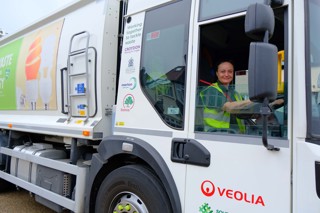Logistics UK and the British Retail Consortium (BRC) have written to the business secretary urging the Government to reconsider its decision not to grant temporary work visas to HGV drivers from the EU.
The UK is facing a shortage of up to 100,000 HGV drivers, which is impacting retail supply chains and leading to empty shelves.
The Government unveiled a package of measures to tackle the HGV driver shortage and ease pressure on the sector, last month.
They included launching a consultation on allowing drivers to take one test to drive both an articulated and rigid lorry. This, says the Government, would streamline the process for new drivers to gain their HGV licence and would increase lorry test appointment availability.
In a letter to the Department for Business, Energy and Industrial Strategy (BEIS) seen by Commercial Fleet, Logistics UK and BRC welcomed the Government measures.
It said that the publication of the Government’s plans to increase HGV driver testing capacity and simplify the process of attaining a licence should encourage more people to consider a career as an HGV driver.
However, it told business secretary Kwasi Kwarteng, it will take time for the pool of available HGV drivers to reach a scale which matches demand.
“Even if the DVSA is successful in increasing testing capacity to 2,000 passes each week, the backlog of tests is unlikely to clear before the middle of 2022,” it said.
Both the retail and logistics industries are working hard to address the driver shortage challenge by increasing pay rates, offering bonuses, and implementing internal training schemes to upskill existing workers and introducing new schemes including apprenticeships and traineeships, says Logistics UK and the BRC.
But it is warning the coming months which will add further pressure to supply chains, with the start of the school year and anticipated return to workplaces for many businesses in September, which is likely to increase demand for food deliveries to these locations.
Commercial fleet operators will be further stretched by the start of new customs checks and processes for goods movements from Great Britain to Northern Ireland in October, and between the EU and Great Britain in January 2022; and the build-up to Christmas, which is the busiest time of year for many retailers and for the logistics sector when volume requirements increase significantly.
“There are severe inflationary pressures in the supply chain due to lack of drivers, pressure which neither the logistics industry nor the retail industry can afford,” says the letter.
One medium-sized logistics firm has reported that they have so far had to invest £1.5 million just to retain their existing drivers.
Separately, one retailer is reporting an extra £2.3m in costs since April due to the driver shortages as they have already had to increase pay twice in this period to retain drivers. This is compounded by the increased cost of hiring agency drivers, where costs have increased 30% over the past twelve months, it says.
RELAXATION OF DRIVERS’ HOURS
DfT has extended the temporary relaxation of the enforcement of drivers’ hours rules until October 3, previously this was in place from 12 July to 8 August.
The easement permits HGV drivers to spend more time driving than allowed under existing laws to govern road safety and must only be used in exceptional circumstances.
The justification provided by DfT is a combination of the “cumulative impacts of Covid-19 and an acute shortage of drivers of HGVs”, which are causing “acute supply chain pressures”.
Logistics UK says it understands that 450 businesses notified Government of their intention to use this easement; up from around 20 who took this step when the easement was in place just before Christmas.
Given the Covid-19 situation was worse pre-Christmas this is a strong indicator that the driver shortage is causing the increased uptake of this easement, it says.
One retailer has been unable to move their distribution centres to a seven-day operation given the lack of available resource, a move that was intended to support the build-up of stock ahead of the run-up to Christmas.
To support key industries and their supply chains through the challenges ahead, Logistics UK and BRC are urging the Government to:
• Review the decision not to grant temporary work visas to HGV drivers from the EU: Such drivers could supplement the domestic HGV workforce in the short-term, while the testing backlog is cleared, and new drivers are trained and become qualified.
• Ensure that Government skills and training schemes support the recruitment of HGV drivers: By reforming the National Skills Fund to enable HGV driver training to be funded and injecting flexibility into Apprenticeship Levy, such as enabling “front-loading” of training to get trainees driving as soon as possible into the 12-month programme.
• Permanently increase testing capacity: To avoid the backlog of testing continuing into 2022, we need additional staff at the DVSA and more use of delegated testing to permanently increase the number of drivers who are able to take HGV tests each day.
Throughout the pandemic, HGV drivers have been the backbone for the economy, keeping the nation’s businesses and homes stocked with the goods and services they need, says the letter.
It added: “We need BEIS to work with us to ensure the government provides a clear road map and tangible support for industry to ensure that our stores can continue to provide what the country needs every day.”
REFUSE SERVICES IMPACTED
The Association for Renewable Energy and Clean Technology (REA) has also called for a change to immigration rules to allow the waste and recycling sector to recruit the necessary number of HGV drivers in the face of severe shortages.
The REA are asking for HGV drivers to be recognised as an important shortage occupation, with a two-year derogation to the points-based immigration rules for trained HGV drivers.
The effect of the driver shortage is already being felt across the waste and recycling sector, with some local authorities reducing the frequency of, or suspending entirely, the collection of domestic food and garden waste.
These include councils in Buckinghamshire, Essex, Kent, Reading, Doncaster, Cumbria, Milton Keynes, Hampshire, Bournemouth, South Ribble, Brighton and Hove, Derbyshire, Exeter and Surrey.
Jenny Grant, head of organics and natural capital at the Association for Renewable Energy and Clean Technology (REA), said: “HGV drivers must be recognised as an important shortage occupation with a two-year derogation to the points-based immigration rules for trained HGV drivers. This will help to alleviate the problem in the short to medium term and allow employers to recruit the number of drivers required to continue to effectively deliver their services and contribute to the Government’s net zero ambitions.
“This is not just a necessity for our sector, but a crucial change needed to protect supply chains across the economy – from waste collections to food supplies and retail. As we head towards Christmas, the impacts on our everyday life could deepen unless this situation is resolved.”






















Login to comment
Comments
No comments have been made yet.